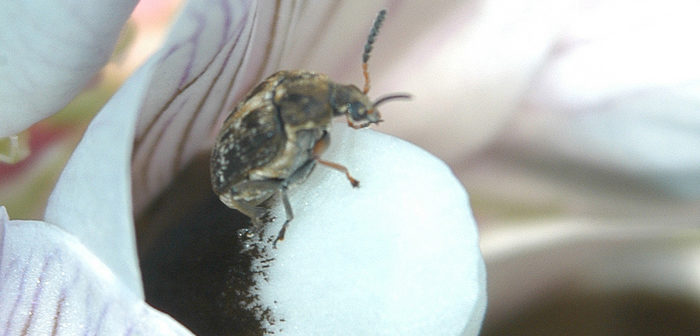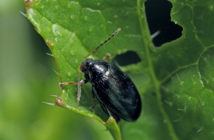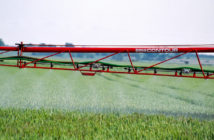Bean growers have a better chance to control bruchid beetle this season, but may need to start control programmes earlier and protect crops for longer if there’s another long hot summer.
The good news is that, after such a relatively mild winter, adult beetle populations are typically less problematic, according to Syngenta Insecticides technical manager, Dr Max Newbert. He cited research that showed when beetles remain active through a warm winter, but without adequate pollen food resources, there are lower numbers surviving through to the spring.
“Coupled with the reports of good establishment of winter bean crops, along with strong emergence of spring beans with few signs of weevil damage, there is the potential to justify controlling bruchid beetle and aiming for a human consumption premium,” he advocated.
Whilst the BruchidCast advance warning system has proven highly effective in predicting the onset and in-season bruchid beetle breeding and egg laying, Dr Newbert reported trials have shown a big advantage in earlier well-timed control of the adult population to reduce initial numbers.
“If bruchid are actively present in the crop as it reaches the susceptible first pod set on the lower trusses, apply a knockdown treatment with Hallmark Zeon when temperatures reach above 15°C,” he advised. “That has shown to positively reduce the amount of egg laying when the BruchidCast trigger point, of two consecutive days with a temperature in excess of 20°C, is reached.”
Dr Newbert pointed out that this approach, to reduce egg laying potential, means a second application, with thiacloprid, could better target any remaining hatched larvae. He also reminded growers that, with any insecticide application for bruchid beetle, no triazole-based fungicide should be included in the tank mix.
Trials had shown alternating knockdown of adult beetles with Hallmark Zeon, along with systemic treatment for larvae with thiacloprid, could give the best reduction in physical holes in beans. Initial reduction in egg laying is key, however, since even tiny nicks in the bean seed as any larvae ingest the insecticide, can make the seed more susceptible to fungal infection during storage – leading to greater losses.
“If BruchidCast indicates prolonged beetle breeding activity through the summer, growers may need to continue the alternating programme to achieve desired levels of control,” he added.
Growers and agronomists can register on the Syngenta website to receive localised BruchidCast warnings by email.




